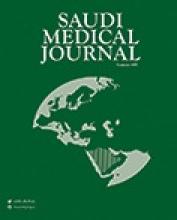To the Editor
A recent study by Al-Drees et al1 demonstrated that problem based learning (PBL) significantly improves knowledge and various learning skills in a system-based hybrid curriculum. We agree with the benefits of PBL as a medical education-learning tool. However, like other educational methods, PBL has its strengths and weaknesses.2 Problem based learning can cause changes in affected factors, such as self-directed learning, motivation, and in the acquirement of knowledge. However, some learners experience difficulties with heavy homework burdens and group activities. Contrary to expectations, some previous studies also reported that PBL did not promote learners’ self-directed learning ability, and did not show positive effects on critical thinking. Discrepancy regarding the virtues of PBL might be partly explained by differences in study subjects, socio-cultures, timing of incorporation of PBL into courses (such as, before or after lectures), and PBL contents.3 Therefore, to overcome the weakness of PBL, systematic good tutor training is essential to enhance active, self-directed learning.4
In the study of Al-Drees et al,1 students found PBL sessions helpful for understanding basic science concepts, which indicates PBL performed well. However, we have some basic concerns with this finding. The PBL modules are ideal if learners can identify and resolve problems in clinical situations, and understand the basic medical science involved.5 Although most PBL modules target understanding of basic sciences, modules can involve basic sciences, clinical medicine, humanities, and social sciences, or integrated issues. The PBL contents usually amount to a system-based integration of basic and clinical sciences. Al-Drees et al1 revealed that the questionnaire used in their study was based on an extensive literature survey. However, evaluations of the reliability and validity of a questionnaire are required prior to its adoption. Nevertheless, the study uncovered interesting differences between male and female students with respect to perceptions of PBL session benefits and the utilization of resources, durations, and preferred places for self-directed learning. Recently, studies reported that PBL performance is related to factors, such as, gender (of students and tutors), age, race, ethnicity, social or cultural background, peer review, grading system, the use of simulations, and learning style, which tutors need to understand prior to PBL sessions.2,3 In the study, students disagreed that PBL is a substitute for the lectures. Every student has different preferred types of learning styles so that they may want to experience various ways of learning. Also, we completely support the necessity of students and staff training. At present, it is clear that PBL offers a useful tool for medical education in the East and West.
Reply from the Author
No reply was received from the Author.
- Copyright: © Saudi Medical Journal
This is an open-access article distributed under the terms of the Creative Commons Attribution-Noncommercial-Share Alike 3.0 Unported, which permits unrestricted use, distribution, and reproduction in any medium, provided the original work is properly cited.






